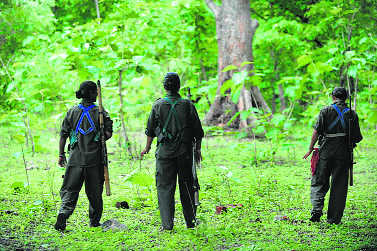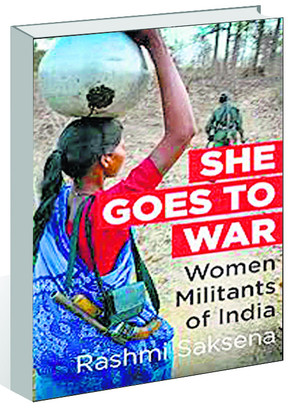
War front: A narrative around the passions, motives and beliefs of women that have led them into the world of terrorism and insurgency Photo:AFP

Rashmi Kalia
Most discourses on counter-insurgency view women insurgents as ‘victims’ of male cadres who not only instrumentalised women into their cause but also victimised women cadres with sexual exploitation and aggression. A feminist analysis of women militants often lacks an insight into their agency, often viewing violent women as lacking empowerment since violence is seen as a masculine domain with ends that are mostly patriarchal in nature. However, She Goes To War, written by veteran journalist Rashmi Saksena, is an honest and systematic narrative on the lives of women insurgents active in various parts of India. The book also is a pioneering study that delves deep into the passions, motives and beliefs of women which have led them into the world of terrorism and insurgency. Rashmi Saksena tells the stories of 16 Indian women militants in the insurgency-ridden areas in Kashmir, Chhattisgarh, Manipur, Nagaland and Assam. All these women have much in common, despite the fact that they come in various avatars, of “killers, victims, mercenaries, lured innocents, misguided youth, double agents and even as the bewitched following their love to the end.” The commonality in their lives lies in the role that the conflict in their disturbed native states played in shaping their destinies and a drive to “take ownership of their unorthodox decisions and carry them through without a thought for the consequences.”Even though the author tells us the stories of women militants, she does not view their lives, and decisions, through the prism of militancy. Imbued with a intensely humane insight, Saksena’s stories are about ordinary women who made some extraordinary choices; be it the beautiful Nighat of Kashmir who fell in love with the handsome separatist militant Khalid and was ready to do anything for her love, or Tulsi of Chhattisgarh who initially joined the naxal bands because she believed they would sing and stage plays. However, not all women featured in the book picked up guns for love or out of ignorance. The book narrates the heart-rending accounts of women militants such as Purnima of Manipur who joined the insurgents after having seen her parents getting allegedly tortured at the hands of the Indian Army and Shanti Kunjum of Chhattisgarh who was forced to join the naxals because her village was caught in the crossfire between the Salwa Judum bands and the naxalites. The book brings an entirely new perspective to seeing women in wars. It informs, empathises, but never romanticises. The book makes the reader see, just a little more clearly, that women with guns, against the State, are still just women. They have fears, maternal love, insecurities and they fall in love too.It also puts forth a very pertinent point to those trying to find a resolution to insurgencies; no insurgency can survive without the support of women. They are either at the forefront or behind the bloodied scenes and bodies. Hence, no resolution can be complete without studying the important roles that women play in these conflicts and also, in helping them integrate into the society when they return from the throes of violence.
